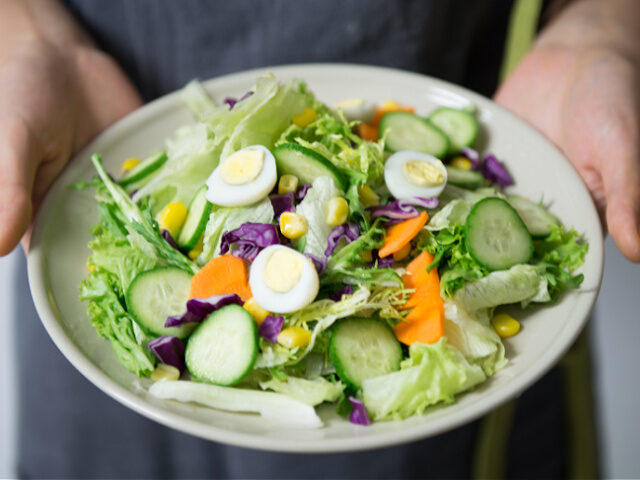Both Western news outlets and Chinese state media this week uncovered a hot new trend on Chinese social media: “white people food.” The trend consists of Chinese users expressing astonishment at the horrifying discovery that some Americans and Europeans eat sandwiches and salads for lunch.
The gist of the “white people food” craze — more colorfully dubbed the “lunch of suffering” by one Chinese blogger — is that Chinese diners prefer more elaborate and heavily spiced meals, so they cannot believe Westerns would be satisfied munching on lettuce out of a bag or making lazy sandwiches with a few scraps of processed meat and a forlorn slice of cheese.
“White People Food” has little flavor or “zero feeling” and requires minimal preparation, often being eaten directly out of a package. Chinese social media users made a game out of recreating the most melancholy of foreign lunch items and expressing their extreme feelings of guilt and despair when eating them.
Chinese people eating white people food to experience "what it feels like to be deαd". I snorted. pic.twitter.com/NE7fCmGixT
— The Genius (@Truth_n_Respect) June 14, 2023
“It is a handful of oatmeal mixed with low-fat yogurt, with half an apple and a carrot. If such a meal is to extend life, what is the meaning of life?” wailed a Chinese user living in Germany who watched a colleague eat the same unhappy meal for ten years in a row.
According to the Guardian, the “White People Food” trend was “pushed along” by “a viral video of a woman in Switzerland on a train eating a bag of lettuce with ham and a packet of mustard.”
The Washington Post also found the Swedish ham lady looming large in the imaginations of Chinese commentators, one of whom recommended eating a “White People Food” lunch as a good way to “learn what it feels like to be dead.”
“Having too much of it can drain the soul and human warmth out of you,” wailed a Chinese student trapped in the midday meal purgatory of Switzerland.
The Washington Post quoted various Chinese commentators who saw the “White People Food” trend as a bit of harmless fun, payback for Westerners stigmatizing Asian food as unhealthy, pro-communist Chinese nationalists striving to make foreigners look inferior, and possibly even pushback against the growing number of young urban Chinese who are developing a taste for simple and easily prepared Western lunches instead of elaborate traditional meals.
Amusingly, Chinese yuppies appear to have joined their Western counterparts in noticing that Chinese food tends to make you sleepy, which is not a desirable side effect for young urban professionals with full afternoon schedules.
China’s state-run Global Times unsurprisingly went with the cultural superiority angle, although it admitted the derogatory Chinese term bairen for bland Western lunches might be a little harsh:
Although the term may not be accurate or sensible, it does reflect the experiences of some Chinese when it comes to a Western lunch, especially after having a big variety of meaty and satisfying Chinese breakfast.
It is well-known that China boasts a unique variety of food, featuring tastes as it likes to add many ingredients in its cooking. Due to different geographical conditions, the sources of food ingredients, and historical factors, Chinese food has a wide range of flavors, and almost every province or city has a unique style of cuisine, some of which have already established popularity in Western countries – regardless of the level of authentic flavor they keep. So, for Chinese who grow up enjoying different styles of cuisine where the varieties are easily available, it is not only natural that they feel it very “plain” and devoid of “eating pleasure,” but also thought-provoking for them on how much a person could sacrifice in the joy of food for health or perceived “laziness.”
But then, like the Washington Post, the Global Times had to admit that a fair number of young Chinese workers may spend their salad days eating salad:
On Chinese lifestyle platform Xiaohongshu, where millennials make up over 70 percent of users, numerous users, both Chinese and foreigners in China, have been sharing their moments of eating such simplistic food, joining the fad of showing off self-discipline or just poking fun. Some people seriously find these Western-style meals very convenient, time-saving, and easy to prepare. Due to their lower calorie content, these meals have become a choice for many fitness or weight-loss enthusiasts, too.
The Global Times was at least able to reassure itself that “Chinese people are more sensible in their choice of food now than when the Western fast food was first introduced to the country in the 1980s,” so at least they are slapping salami on crackers instead of wolfing down Big Macs.

COMMENTS
Please let us know if you're having issues with commenting.